Say your childhood band featured a Nickelodeon star, you were a musical director at Second City (Chicago’s largest comedy institution) when you were only 18, and your first media composing gig was with Hans Zimmer—you may think you’d be able to coast through the rest of your career.
But for Alexander Burke—who composes for films and Netflix series, has written songs for movies like Iron Man 3, plays keys and vibraphones for established recording artists, and records and tours with his own band, Magnolia Memoir—the journey hasn’t necessarily been as auspicious as its beginning. For starters, he was fired from Zimmer’s team on his very first day of work (he’ll explain below).
But his early experiences with live improvisation and a formal music education have set him up well for making music for film and TV. Below, we talked to him about what he learned and didn't learn in school, his favorite compositional techniques, and what any aspiring media composer should know before starting their own career.
For more info on Alexander Burke, check out his website here. And for more conversations with media composers, read our interviews with Tim K and Gregory James Jenkins.
Can you give us a little bit of background about yourself? How'd you start as a musician?
I got my start actually at a Jerry Lee Lewis concert when I was 14. I was trying to get backstage, and a kid named Drake Bell was also trying to get backstage. We were the only people there probably under 50, and one thing led to another—he was on The Amanda Show at the time on Nickelodeon, and I wound up joining his band Drake 24/7. We played on Nickelodeon, and at the Palladium, and all kinds of crazy places.
I just figured that's how it went when you started a band [laughs]—it never occurred to me that there would be any struggle until years later when I realized how lucky I was. I quit the band when I turned 18, and moved to Chicago—I was from Orange County—to go to Columbia College, and kind of through a weird series of events I wound up as a musical director at Second City when I was 18, playing piano, and writing music for all these improv shows. I was lucky enough to tour and play with amazing people like Keegan-Michael Key and Mike O'Brien, and just great, amazing people. Was in New York for a minute trying to be a jazz vibraphone player. Then my friends from Second City started getting jobs doing television, and television production.
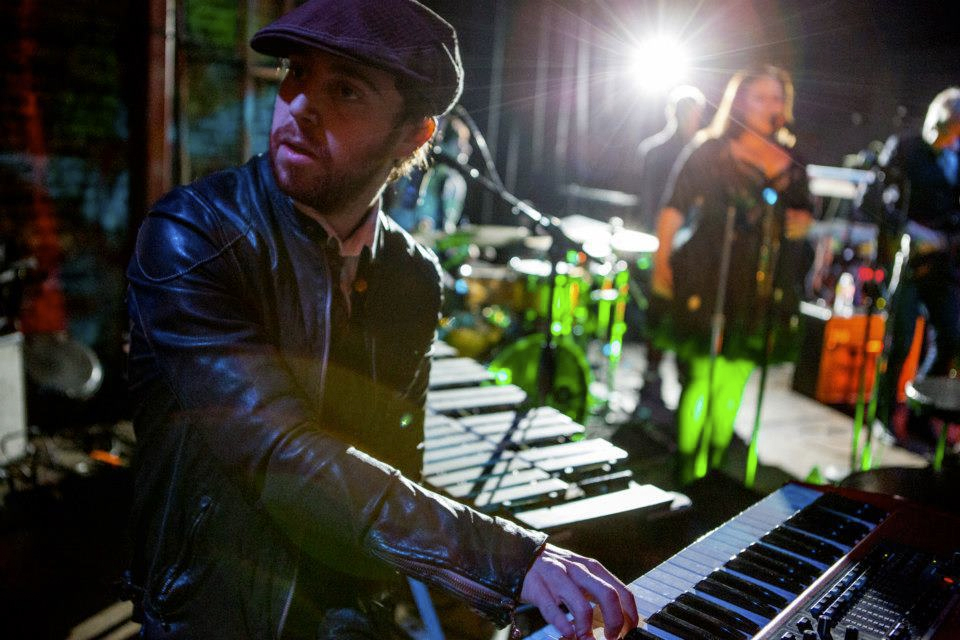
Real quick about the vibraphone. I know that's a primary instrument of yours. What's the story with that? How did you get started playing vibes?
I went to Interlochen [Center for the Arts], and I went the same year as Eldar Djangirov, who was signed to Blue Note when he was 15 or 16—one of those prodigies that comes along once every century, just brilliant. I wanted to be in the top band, and there's no way I could play better than Eldar, so I lied and said I played vibraphone.
I always loved the instrument. Actually, one of my favorite records was—Lionel Hampton a trio with Art Tatum and Buddy Rich, and their version of "Hallelujah" just blew my mind. I used to listen to that on repeat. I loved the Very Tall Band, which was Milt Jackson, Oscar Peterson, and Ray Brown. I actually had desperately wanted to play vibes, and just didn't have access to vibes, so it wasn't like I came in not knowing anything. But I lied, and I told them I played vibes and that I forgot my mallets. I called my parents, and told them what I did and begged them, and they were amazing enough to buy me a couple pairs of mallets and overnight them to me.
And I just practiced my ass off. Interlochen is like military camp, except for the performing arts, where they play "Reverie" at like 6 in the morning, 6:30, run and work out and make your bed. I kind of took to vibes like a fish to water. I was a little bit of a vibraphone prodigy. I could naturally do four mallets without being told how to move them around. The instrument made more sense to me than any other instrument I had ever played.
I've recorded vibes with Dionne Warwick, and Billy Ray Cyrus, Fiona Apple—I've played vibes on a lot of crazy records.
After you had done a lot of the comedy stuff here in Chicago and were doing some direction with that, then you moved back to California—what was the first media composing gig, and how did you get into that?
My first gig was technically with Hans Zimmer, but I got fired before I showed up.
Yeah? Continue.
My parents were able to get me in touch with Hans Zimmer's lawyer through family connections, who was able to get me a job with Zimmer. At that time I was anti-computer—I was a strictly pen-and-paper person, which is crazy, being strictly pen-and-paper in the mid-2000s as a 20-year-old, and hate computers. Like, I didn't even have internet, because I was wanting to rebel against that world. I just hated it, as you do in your early 20s.
I was driving to Remote Control [Hans Zimmer's production house] at the time, and got a call. They were like, "When you first come in we need you to cut up a bunch of these recordings of cymbal swells and bows and scrapes and turn them into a VST instrument." I said, "What's a VST instrument?" They're like, "What?" I said, "What's a VST instrument?" Then somehow Logic came out, and I'm like, "What's Logic? What's EXS?" Then they're like, "We're... not going to need you." I was driving there. I was like, "Are you kidding me? Give me a pen and paper, I can write a full orchestra for you, or get me on piano, or vibes." And they're just like, "We don't need that—you're a kid—we need people who understand computers, but thank you for your time."
So I got fired before I ever walked through the front door. And that was my first job. Then I wound up applying to and getting into USC's film scoring program. They have a post baccalaureate program in film scoring, which is amazing.
Right around the time I was getting out of there, a friend of mine Rich Talarico, who I knew from Second City—he was a writer for Mad TV and for SNL, and the writer for Frank TV, which is a sketch comedy show starring Frank Caliendo that was on TBS—and he wound up giving me an audition. I wrote a theme song for it, and some music, and booked the job. So I was 24, I had booked my first TV show, and wrote for two seasons of that before it got canceled.
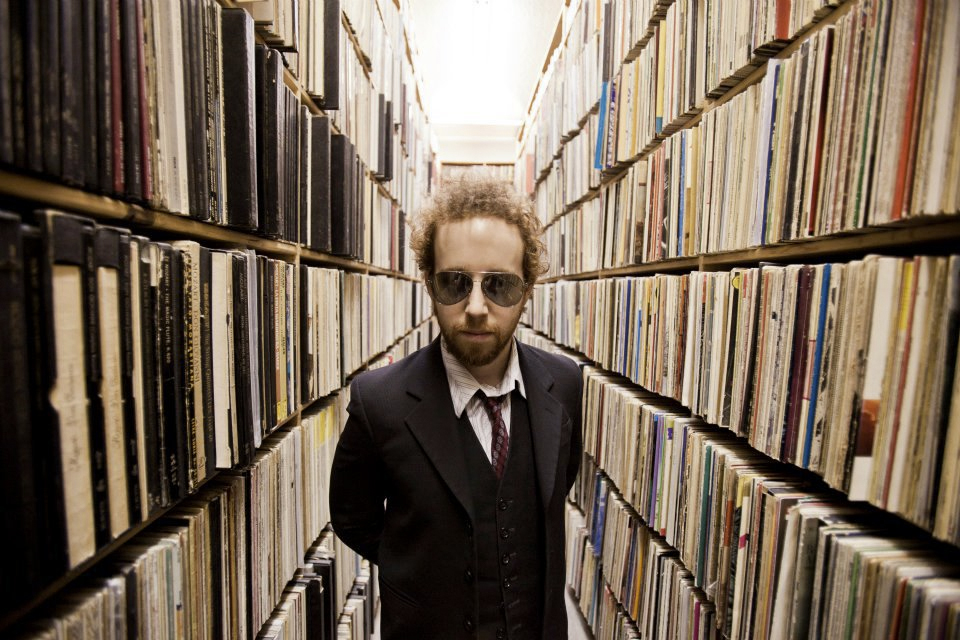
So you had these experiences in your band, and writing music for comedy shows, which is not necessarily directly media composing work—how have those experiences informed your compositional work for media exclusively?
All of that stuff kind of got me thinking in terms of the studio more than I thought before. When I started scoring for TV and film, I was very much into Rimsky-Korsakov, Berlioz, you know—all those schools of orchestration—and I really didn't understand the studio world. I would always have other people do it. But then, you get in a studio with a band, and—I never saw them as the same thing—which was so stupid, looking back at it.
Something that I learned actually from playing with Billy Ray Cyrus was—the producer had me play this crazy over-the-top thing that would have just gotten in the way of the whole recording, but he had an SM57 on this Bosendorfer grand piano, so it made the sound super thin. And then when I played the hook, he put two U 47s on, and then two C12 room mics, and just made it so over-the-top, and then I just played a single note melody that took up all of this room and space. So it made me start to think compositionally differently in the studio. Like, gain a string section but thinning it out and messing with the sound, or getting one clarinet and making it sound huge and over-the-top. And it also made me start bringing weird production elements into it, of recording that clarinet, and then taking Soundtoys and a Moog plugin to kind of screw with it so it winds up becoming like a synthesizer. It made my film scoring come to a whole new level in terms of studio production, which I never imagined.
How has your formal education informed your media composition career?
If I didn't have repercussions for not doing things, and having people be like, "Learn your Lydian scale in all 12 keys, learn all the German augmented chords, explain to me how it works"—if I didn't have people breathing down my neck, yelling at me to do those things, I wouldn't have ever learned how to do it. I would have worked hard, but I would have been so scattered I wouldn't have even found that.
The thing about education is that it doesn't make you a better composer—that's a massive fallacy. It's like, I can teach anybody English, and I could teach them correct grammar, and story structure, and form and structure to stories. But just because someone knows that doesn't make them a great writer, but if you learn how to write, you will always be able to work with that skill.
Learning all of those skills allows me to write 100 times faster than other people. Because I hear something and I can say, Oh, it's this progression, it's this kind of harmonic—someone says something like, "Oh, I want it to be this," and I know it right away, because I got that education. As opposed to sitting at the piano and spending half an hour figuring something out. Because all those half an hours start to compile, and suddenly it can take somebody six days what takes me two hours to do. That being said, the person who takes six days could write a piece better than I write in two hours.
What do you consider to be the most essential skill sets, soft and hard skill sets, to have in your career?
There's so many little bits of expertise. The big thing I have to say is not being weird. [Laughs.] I mean, you want to be an artist, and you want to be weird, but… I went to school, undergrad, grad, and know so many composers who run circles around me, who blow me out of the water, who I listen to their music and it brings tears to my eyes. And they're not working, because they're not able to sit down with a director, and have a conversation with them that makes them feel safe—they're not able to take direction. They're not able to compromise. This is a collaborative art form, and something that you can't do on your own. No matter how brilliant you are, it's impossible to do this on your own.
I love orchestrating, and I think that's one of my strongest things, and half the time I work I have to farm out my orchestrations, because in terms of deadlines and turnaround, it's just not possible for me to do it. I see people who have an ego, like, I need to be the person to do this, and everything suffers.
Also, when I say not being weird I'm being a little silly, but it's also being able to have a conversation with the director. We're the people who scare the director the most. If a director doesn't like an actor's performance, an editing, a color correction, they have the language to say what they don't like about it. No one in production, for the most part, has the language to tell us what they don't like about it. So when you work with a new director, or a director you've worked with before, it's like you have to find the commonality between the two of you, a common language.
They have to feel safe that if they don't get what they want, they're able to communicate what they don't like to you, and you'll be open to that. That's the thing about not being weird—it's being able to sit down and not make a director feel awkward or strange when you spend three minutes figuring out that they don't like a bassoon, because they don't know what that squawking thing is, and you don't understand what they're saying when they say squawking thing.
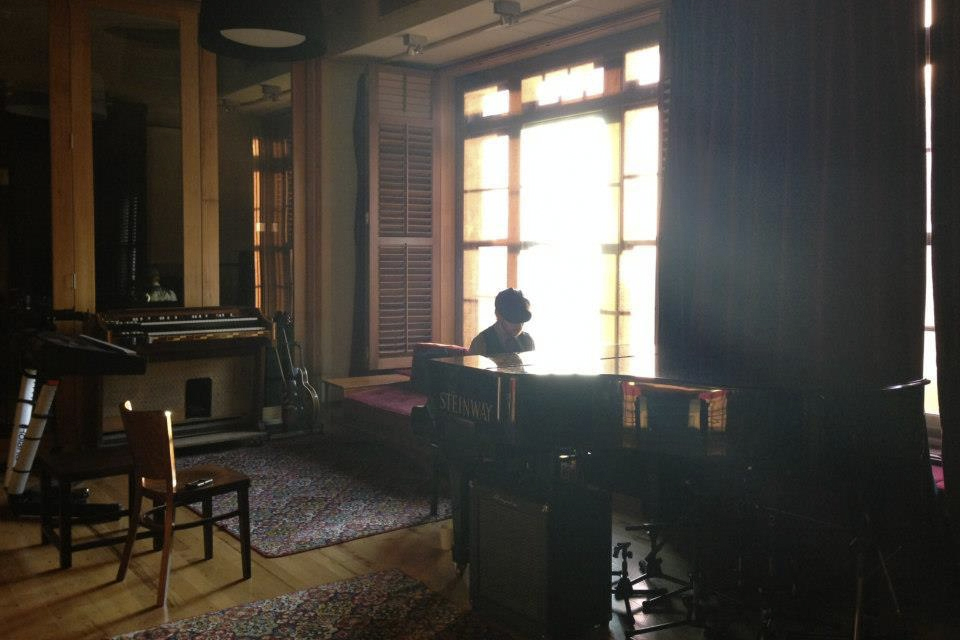
So it's kind of a translation of dialect of sorts, right? So what he says, and what that means, and how that relates to your understanding and work.
Yeah, exactly, and then being able to take what they say, and translate it to the sound of orchestras.
What's the strangest request a director, or a film, TV producer has given you in describing the kind of music they want?
David Lynch told me—I was playing synth bass on a record he produced—and he said he wanted it to sound like a 14-year-old girl in love for the first time who didn't know her heart could be broken, but the idea of heartbreak exists in the ether, but it's not from her.
Honestly, Second City saved my life. The whole thing with Second City and Improv Olympic and these places that I played at, I would improvise a full musical with them, and I would improvise crazy stuff. If I hadn't had that experience in Chicago for five years of improvising crazy stuff like that, I would have just stared at him blankly, and probably slowly fallen into a severe panic attack. But in my brain I'm like, OK, super big, round, woody sound with just the slightest bit of overdrive.
What are your favorite compositional tools, software-wise, hardware-wise—not necessarily your entire studio, but the things that are regular utilities for you?
I find I usually start with piano. I find that when I start writing with MIDI, I get just very boring and parochial, and I lose kind of all humanity. It just doesn't work for me. I'm very jealous of people who can do that, because they get to skip a step. But it's me watching the film on starting with a piano, or a vibraphone, or a mandolin, or whatever I see as the main instrument that I kind of want for it. I have a grand piano in my spot, and I have a monitor on top of it, and that's kind of where I love to write. If I'm doing mainly live instruments, always Pro Tools—I love Pro Tools. If I'm doing more MIDI-based, I do Logic, and I'll do the final mix in Pro Tools.
I actually use the Mellotron [M4000D] constantly on everything. My friends actually make fun of me for how much I use the Mellotron. I hate programming MIDI strings, and I just snapped one day and bought the Mellotron. I would much rather play Mellotron strings than program MIDI strings. It's a completely different beast, but it's equally professional-sounding. I find that the Mellotron somehow sneaks its head into pretty much every score I've done for the last two years. I also wind up running it through a crazy series of pedalboards.
How do you get to that point of knowing what you want to write?
I'll watch the movie a lot. I love to go on walks without my cellphone, and be detached from the world. It's thinking, because the whole thing with scoring film is it's fighting dirty. Actually, I'll spend a lot of times just temping things that don't make sense, just to see how things work to inspire me.
There could be a really great scene, and I could try scoring it every which way, and then I'll have a realization of, Oh, they're at a shitty restaurant. I'm going to write some really shitty canned music that's 16 measures long that just repeats, and I'm going to use really shitty instruments to play it, like shitty MIDI instruments, and it's just going to sound terrible, and it's going to be really annoying, as opposed to this beautiful orchestra thing, and the fact that they're in this restaurant, it's going to make the scene so much cooler.
Then when it does the close up on the girl, that's when they're going to sneak in all these instruments, and try to pull back that terrible 16 bar loop I wrote, and write this great theme that plays to what she's thinking of, where she's wondering if the guy is cheating on her or not. And as it backs up again I'm going to slowly transition back in that terrible 16 bar loop.
So a lot of it is kind of figuring out that kind of stuff, and that's the part that is so much fun. If you listen to a lot of great film scores, they're actually not like the soundtrack, where they're edited to be more of a coherent song. Planet of the Apes, a lot of the music, the original one that Jerry Goldsmith did, if you just listen to the score without watching the film, it just sounds like a bunch of children banging on things, and makes no sense. But when you watch it to film, it's one of the best film scores ever made.
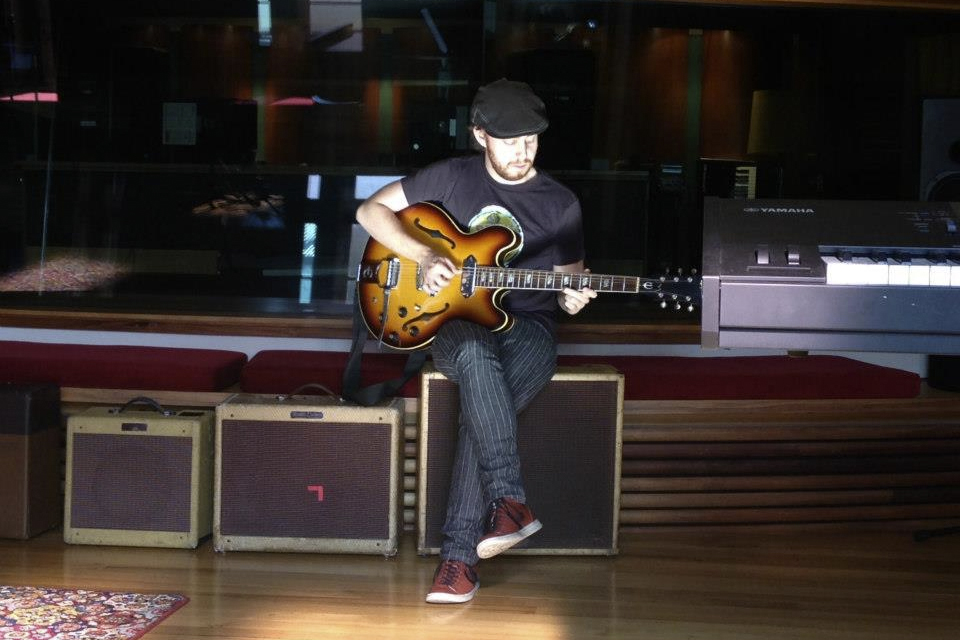
So it's kind of like a bit of getting inside of the headspace of what that world feels, or sounds like, and then kind of realizing what that goes from there?
Yeah, exactly, and you want to be able to sonically brand the film. If you think about all the great movies, even if you can't hear the music, you know what it sounds like, like Eternal Sunshine of the Spotless Mind—you can hear those backwards instruments and Mellotrons and everything, There's the sound of that world, or there's that sound to There Will be Blood. There's the sound to Star Wars, where it's like you want to sonically brand that movie. You want to help create a full world to it, the visual is only half of that world.
When you think about the sonic branding, it goes further, sonic branding is as much timbre as it is melody, and instrument choice.
It is, and that's the thing I wish they actually taught at school more, and maybe that's something that I just missed with where I went. But, just where I put a microphone on an acoustic guitar will change the way you feel about the guitar, it's crazy.
This leads to one question, about how you go about choosing timbre and instrumentation? Say you need to make the sound of a villain or a hero—where do you start?
I think that any time you fall into a situation like, this is the sound of a bad guy, this is the sound of a good guy, this is the progression of good, this is the progression for evil, it doesn't work. In movies, unless you're scoring a Marvel film, there's no bad guy who is bad, who is just like, "I'm a bad person, I want to kill things because I'm bad." Even the bad guys think that they're good people, and they're just doing bad things.
I'm scoring a film now with someone slowly going insane, Violent Spaces—it's really good. When I tried to make the music sound as insane as him, it didn't work. When the music just sounded like very pretty classical piano, it was perfect.
How do you develop a theme over time?
Coming from that jazz world, I love to improvise, once I figure out what the theme is. [Pre-music] it's a silent movie, or a semi-silent movie I guess. I love to just sit and play piano over the entire film, and just watch the movie and record myself, and just improvise—once I have themes and ideas—over the entire film. I'll do it again and again and again, and start to figure it out. When I first started at Second City, I would turn on the TV and mute it, and I would just improvise piano while watching the TV. I remember literally improvising over Mad About You. Improvising over Freaks and Geeks, over the Secret World of Alex Mack, or Boy Meets World.
Figuring out what feels right, and what feels cheesy, what doesn't feel cheesy. Just starting to improvise on those themes, I start to feel like an archaeologist, and things start to reveal themselves to me. Every time I play through the film again and again, more of it seems obvious, and it's also a crazy feeling to sit and improvise for an hour-and-a-half watching something.
It's kind of a linear approach for you then, right?
Yeah, I think linearly. I know a lot of composers jump around to different sections, and they'll do this theme and this theme and this theme. I think it might be [that experience at] Second City—I would improvise musicals for an hour long and I would improvise a play for two hours. I did so much linear improvisation. When I score something, I score scene by scene, by scene, by scene, which is different than most.
Once I'm done though, I'll go backwards, and I'll start to fine tune. Like, Wow, this gets too repetitive, because they're back-and-forth. Or, I'm going to the theme here, I'm going to build this, I'm going to make this a little smaller. I really like working linearly. It allows me also not to foreshadow. I find when I don't work linearly, it's like you know this person is actually the bad guy, I'll give it away. Working linearly, I don't foreshadow in the same way.
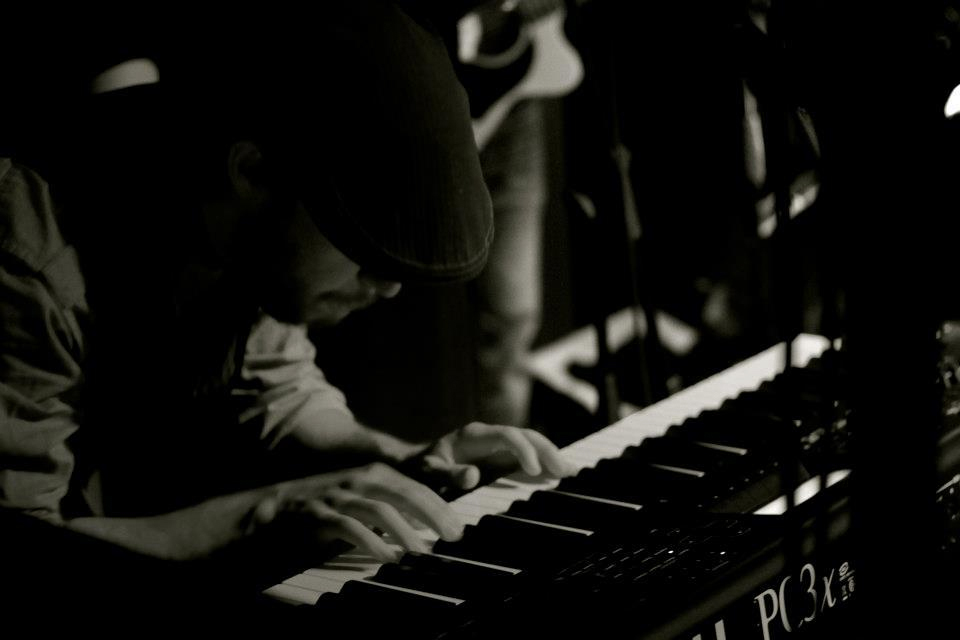
How much of a battle is it to work with stock music or temp music to create a new piece that encompasses what the director loved about the well-known placeholder?
A few answers to that question. Library music can be terrible—there's a couple networks I work for where they'll call me up on Thursday morning, they go to air on Friday, and they're like, "We couldn't find stock music for these three scenes, so we need you to write something original in the next two hours for these scenes." Crazy, and kind of miserable. But it's like, you pay me enough money off this one day that I could score the entire show. The ego, and the creative person in me, the artist, says, "Just pay me that same amount and let me do the whole show—the show doesn't need that much music." As opposed to waking me up at 5 a.m. because you're based in New York, and making me find a string quartet by 8 a.m. to come over and give me two hours to scribble some stuff out.
So yeah, the stock music, it sounds generic. What's amazing about stock music—which, I have to give props to those composers, is they're able to make cues that literally work over anything. But there's a generic quality, where even though they work over anything, they don't make anything special.
In terms of temp music, I actually love temp music. I love to temp when I'm scoring, and take different music and put it in to try things out. I think that very often the director does have temp-love, and it is annoying, but I think the pros of temp outweigh the cons of temp, for me. For the director to be able to show me at least the basic kind of world he wants—even though he might get married to Gladiator. Even though I have done scores, like three scores where all it does is rip off the Gladiator theme, because they've fallen so in love with Gladiator—and that's really annoying—I'd rather have that and have the director kind of know what they want, than have a back-and-forth for three weeks with different possibilities.
Have you found any go-to utilitarian compositional moves? What types of chords, or intervals do you tend to use to create suspense, love, or loss?
I love chromaticism. That's something you can always hear in my compositions, like, if people are falling in love, chromaticism moving up. If people are dying, chromaticism down.
Chromaticism, the answer to all of your musical composition woes.
My friends all make fun of me because if I screw up, or get lost when I'm playing a solo or improvising, I've memorized and worked up all these crazy complex chromatic moves, and I'll use those chromatic moves to get back on, or make it not sound like a mistake. My friends will all stare at me and start laughing because no one else knows, but they know. When I say chromaticism, I don't mean straight up C to C# to D to D#. I mean, I'll do C then C sharp over A7, E flat diminished to a C9 with an E in the bass. It'll be ways to do chromaticism within having a melody.
I think that major I to minor IV is one of my favorites, or major IV minor IV to I, those are things that I just—they're just little things that I find always work. Depending on what I do with the melody, I can make it sound like someone is falling in love, out of love, or is about to be killed... I feel that type of progression lets me do so much stuff.
It's funny—I've written a lot of songs for film. I've written songs for The Gift and for Iron Man 3. And for me I'm such a harmony junkie, the harmony is the most important part—the harmony, rhythm, and dynamic is most important to me. Someone could write something like, "I love you, I love you, I love you forever" as the chorus in the most basic, whatever lyrics, but I can make it sound like someone has just broken up, and is trying to convince themselves they don't love the person, and create all of the story with harmony, and in the dynamics.
Or someone can write a melody which is a three-note thing, which is really kind of basic, and the way I harmonize it, and add the rhythms and dynamics, I can make it sound like the most exciting thing in the world.
What's the break down of your time, how much time do you spend in a day or a week composing, recording, and producing, securing work, meeting with directors and producers?
Honestly I feel like, thank God I'm good at music. I feel like 60 to 70 percent of it is meeting and securing work and talking with people. In my mind I feel like I'm paid for getting the gig and doing the administration of the gig. The actual music, in my mind, I do for free. The politics, the getting the gig, the securing the gig, the minutiae of organization, the contracting—to me, that takes up at least half my time.
The more successful I become at this stage in my career, the less time I actually have to make music. I'm doing the highest-level projects of my life with the least amount of time to work on it. Because I'm having to do red carpet, I'm having to do promoting, I'm having to deal with contracting, different things like that.
In terms of how long writing takes me, the way I usually work is I give myself deadlines. For example, I have to write 10 minutes of music in the next three days, 10 minutes of fully written and produced music in the next three days. I might sit down and realize it just needs to be solo mandolin, and I can play mandolin good enough, and I'll sit down and I'll play a little mandolin. And then I'll have two-and-a-half days free to do whatever I want.
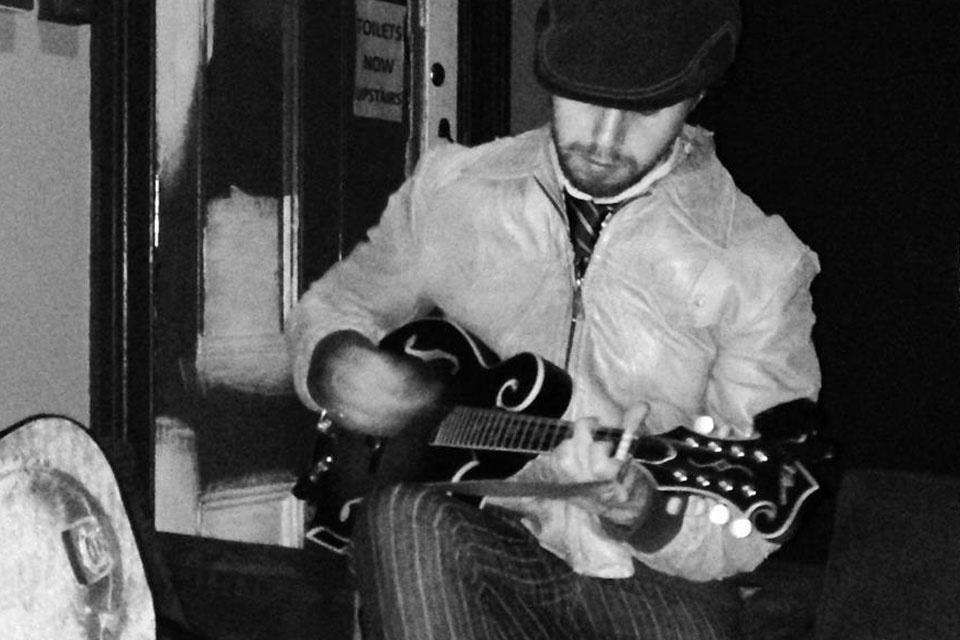
Or, it could just not come to me, be very difficult, and I could wind up working one 20-hour day, and then 48 hours without sleeping trying to write and record that music. It all just probably evens out in the wash to eight hours a day, 10 hours a day, but it's like you can't quantify creativity and how long that will take.
In terms of scoring, producing, composing—it's not on a week-to-week basis, but on a month-to-month basis, I find. I'll wind up scoring a film, and that's all I'll really do for a month or two. Then I'll produce a record, and that's all I'll do for four weeks, three weeks, a month—so it kind of differs that way. Although I also find that I don't really make a living gigging anymore, but I need to gig for my own sanity. If I don't play one or two shows a week wherever, I would really lose my mind and go crazy.
So I play with my buddy, he was actually—my friend Eban [Schletter] writes the music for Spongebob Squarepants. We played for a show called "The Moth," which is a storytelling show, and I play vibraphone, and he plays theremin, and we play weird hipster Disney covers of things in Echo Park. I have my band Magnolia Memoir, we do a few shows a month, and we'll travel and do one-off conventions, and at Comic-Con, or in New Zealand, or in Australia. I still play with Billy Ray Cyrus and Save Ferris—they're great legacy bands, and we'll go off and do a couple shows here and there, and I absolutely love that.
What are you working on right now?
I'm starting pre-production for a new movie called Abducted—it's so exciting. One of my best friends wrote and is directing it. It's being put out by Tunnel, who did It Follows. Casting just started this week, but they actually got Billy Ray Cyrus to be one of the leads in it—I'm meeting with him in the next day or two. They licensed two Tom Petty songs, "Running Down a Dream" and "Face in the Crowd." So we're actually figuring out kind of how I'm going to produce Billy and work those songs out for the soundtrack. It takes place in 2003, 2004, so it's kind of early 2000s metal rock, which I'm so excited to get to do.
I have another film, Violent Spaces, which is this great little indie film I'm scoring, which I'm very excited about. I just scored A Mortified Guide, which is this great series on Netflix that just came out, which I was at Sundance promoting. I did Haunters, which is this labor-of-love doc that just came out after four years of work on it, which is also on Netflix. And I wrote two songs for All I Wish, which is the new Sharon Stone movie that's now on-demand. And also my band Magnolia Memoir—we just finished our latest record, and we recorded at Jim Scott's, and I just couldn't be more excited about this album. We just finished shooting a music video that will be coming out very soon, date TBD.
